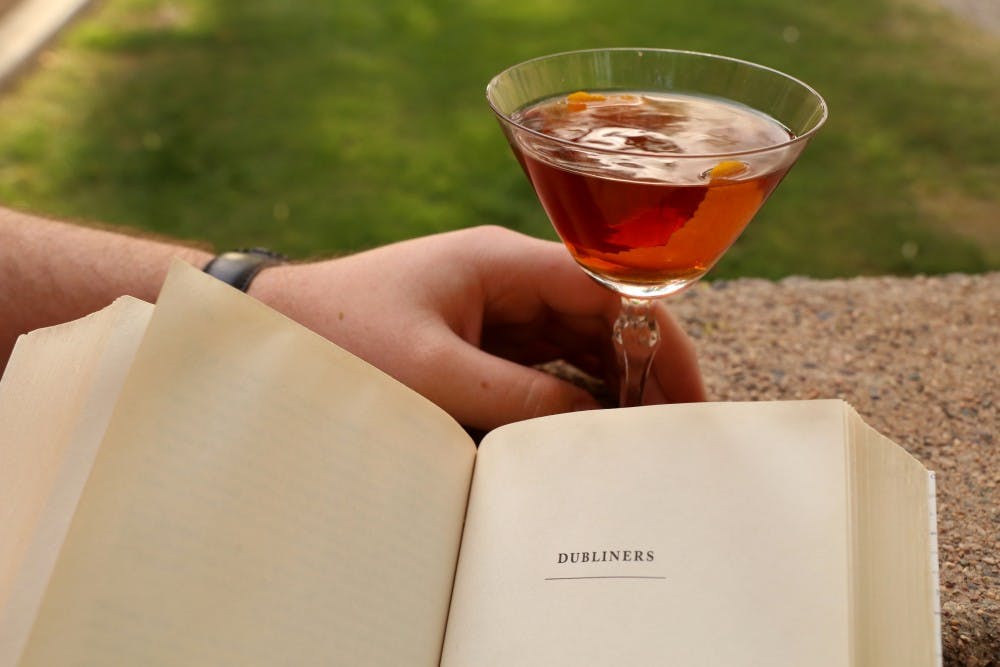Each week reporter Carson Abernethy drinks his way through great works of literature, reviewing books and the booze that inspired them.
“Dubliners” is James Joyce’s collection of short stories, providing a panoramic scope of Dublin at the start of the 20th century.
Its stories are divided into three categories: childhood, adolescence and adult life. Therefore Joyce reflects on the eponymous Dubliners at different angles and at different stages of life.
“Dubliners” is often seen as Joyce’s most accessible work. Later novels such as "Ulysses" and "Finnegans Wake" are noted for their difficulty and level of eruditeness. "Ulysses" is that one book no one finishes, but is considered one of the greatest of all time. "Finnegans Wake" is a book no one has read or understood, and is often considered the most difficult book in the English language. In “Dubliners,” Joyce relied on a simpler narrative style, but one that still resonates.
The Emerald is a cocktail essentially derived from the Manhattan. Take out the rye and add in Irish whiskey, and you’ve gone from New York to the Emerald Isle. Irish whiskey is sadly a spirit that doesn’t find itself in many cocktails, but this is one well suited to it. It’s a much better homage to Ireland than green beer.
Recipe
2 oz. Irish whiskey
1 oz. sweet vermouth
1-2 dashes orange bitters
Stir well with ice, strain into cocktail glass, and garnish with orange peel.
Prose: 4.5/5
Joyce’s language in "Dubliners" is exquisite, and one of his strengths is his wit. "Dubliners" is replete with bawdy puns and wordplay, though much subtler and less frequent than his choices in "Ulysses" (which led to obscenity trials). The prose is much simpler and more direct than later works, but it does not lead to easy conclusions as Joyce wanted the reader to make their own judgments of the stories and characters. “Dubliners” also marks the beginning of Joyce’s eschewing of quotation marks, instead using quotation dashes for dialogue — an interesting literary technique not often seen in English language novels.
Characterization: 4.5/5
The characters are incredibly diverse, as it is a collection of short stories, it allows for a multitude of characters with different characters per story. There are a number of resonating characters, particularly protagonist Gabriel Conroy of the last story in the collection, "The Dead." Other notable characters include the boy narrator of “Araby,” trapped between adulthood and childhood and driven by young love that must go unfulfilled, and Eveline in the story “Eveline," who must decide between the promise of new life in Argentina or the responsibilities of home. Many of the characters are colored by their futility, their inability to take the hero’s journey and how their actions bring them back home again.
Cohesiveness: 5/5
The structure of Joyce’s story collection is one of its great strengths, and it really is a snapshot of a city at a moment in time showcasing all the strands of existence that weave a perfect image of the time. There’s also subtle connections between the pieces Joyce employs, making it less of a disjointed collection of stories and more of one grand, loosely connected narrative. Joyce starts in childhood with “The Sisters,” and culminates in “The Dead” (one of the greatest short stories ever written), really expressing the totality of the human experience, ending with that memorable image of “snow falling faintly through the universe and faintly falling, like the descent of their last end, upon all the living and the dead."
Relevance: 4/5
Joyce is of course capturing a very specific time in a very specific place, and more so than a lot of works, it is inextricably grounded in its time, early 20th century Dublin. But it also captures much bigger ideas than that, like childhood, young love, death, loss and the desire to escape from shallow lives. “Dubliners” is a wonderful dissection of the human condition, transcendent of time and location. It also serves as one of the best books on writing, and it is really a book any aspiring writer should read.
Overall: 4.5/5
“Dubliners” retains the complexity and depth of Joyce's later works without their academic and intellectual rigor. They comprise some of the greatest short stories ever written, and as we study these characters from 20th century Dublin, we assess and study our own lives. Far from its crowded streets, we are all in a sense Dubliners.
Related links:
Books & Booze: 'The Sun Also Rises' by Ernest Hemingway
Books & Booze: 'Lolita' by Vladimir Nabokov
Reach the reporter at cabernet@asu.edu or follow @carson_ab on Twitter.
Like The State Press on Facebook and follow @statepress on Twitter.




